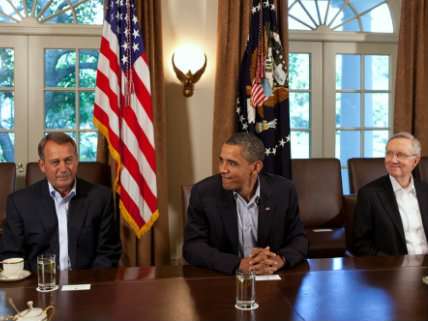The Emerging Battle Between Political Outsiders and Insiders
Spending bill vote reveals a new political battle - not the left versus the right, but the edge versus the center

Last week, the House faced a momentary crisis as it attempted to pass a $1.1 spending bill—the "cromnibus," which combined 11 appropriations bills with a continuing resolution. Conservative Republicans objected because the spending bill did not stop President Obama's executive action on immigration; liberal Democrats, urged on by Sen. Elizabeth Warren (D-Mass.) opposed a tweak to derivatives regulation in the Dodd-Frank financial reform law.
White House support for the bill helped overcome last-minute Democratic objections, and the Republican leadership attempted to quell dissatisfaction on the right. The bill passed in the House, and moved on to the Senate, where it was backed by the Democratic leadership. Over the weekend, it passed, but not before first losing a chunk of Democratic support over the financial reform, and then facing an unexpected procedural delay from Sen. Ted Cruz (R-Texas), who forced a vote signaling opposition to Obama's immigration move before allowing the spending bill to pass.
In the end 21 Senate Democrats and 18 Republicans joined together in opposition to the bill. The Democratic objectors were among the party's most liberal members; the Republicans some of the GOP's most conservative. And yet, despite their different objections, they were, in some sense working together—to defeat the bill and the wishes of the leadership of their own parties.
For years we have heard about increasing polarization in American politics and the growing divide between the left and the right. But the spending bill vote reveals another battle emerging—not the left versus the right, but the edge versus the center.
This split between the outside and the inside, between party leadership and party provocateurs, has emerged on numerous issues in recent years, many of which have national security implications. Outspoken legislators on the left and right have joined forces to oppose mass surveillance programs run by the National Security Agency, as well as President Obama's ongoing use of drone strikes. President Obama's initial plans to launch airstrikes against Syria in the summer of 2013 were stymied by bipartisan pushback from Capitol Hill.
It's even possible to see a version of this dynamic at play in the fight over the Senate's report on the CIA's torture program. With a few exceptions, the politics since the release have been straightforwardly partisan, with Democrats in favor of release and Republicans opposed. But before the report was released, Democrats had to fight the Obama administration, which put up "fierce resistance" to its release, as one Senate aide told Foreign Policy. It was a struggle between the party's power center, and those on the outside of it.
Those sorts of messy internal dynamics are already common on the right, especially in the House, where Speaker John Boehner has spent the last four years attempting to organize an unruly caucus that has never been overly enthusiastic about falling in line behind party leadership. Under Boehner, votes to fund the government or raise the debt limit that in an earlier era would have sailed through with little controversy have consistently turned into legislative nail-biters, passing only at the last minute, and with the slimmest margins.
The split over the spending bill suggests that similar sorts of struggles are now more likely to appear on the left as well, as Democrats attempt to reorient and rethink their party's message and direction after a punishing midterm loss.
Indeed, the spending bill squabble, which arose out of liberal concern about the weakening of financial regulations, is only the latest and most prominent sign of the Democratic party's internal divisions. Even its biggest legislative victory in recent political history—the Affordable Care Act—has come up for self-criticism in recent weeks, with Sens. Tom Harkin (D-Iowa) and Chuck Schumer (D-NY) both expressing regret at the structure and timing of President Obama's signature legislation. A majority of Democrats in House races, meanwhile, didn't express clear support for the law during the midterm campaign, and more than a handful actively ran from it.

It's not an accident that Obamacare and national security have become critical points of internal tension. The edge is fighting the center because the parties are fighting themselves, and they are fighting not only over direction but over legacy—how much to embrace the policies and ideas of administrations past.
For Republicans, it's the Bush administration that still casts the biggest shadow over the party. The GOP has spent recent years struggling with whether and how to break from that era—whether by moderating that administration's aggressive posturing in the War on Terror or by pursuing more viable alternatives to its disinterested domestic policies.
Arguably that struggle started not in 2008, with the election of President Obama, but in 2006, with the Democrats sweeping victory in the midterms.
Democrats now appear to be starting down a similar path themselves, with friendly observers urging the party to rethink its messaging, tactics, and policy choices, and a growing sense that the party no longer knows what it stands for.
What we're witnessing, then, is not only a debate between the edge and the center, but a debate between the future and the past, one that's happening both within the parties and across them, in tandem and at cross-purposes, as part of a process of reform and retooling on both sides of the aisle. Both parties, or at least parts of them, have realized that what they've been doing is no longer working, and change is necessary.
That's the mark of a political system that, for all its flaws and frustrations, remains healthy enough to engage in self-examination and maybe even rehabilitation. And it's good news for the growing numbers of Americans who don't easily identify with one party or the other, or even with traditional conceptions of left and right, which have always been the province of the center. Indeed, the fact that there's a fight at all is a sign the edge is winning.


Show Comments (42)